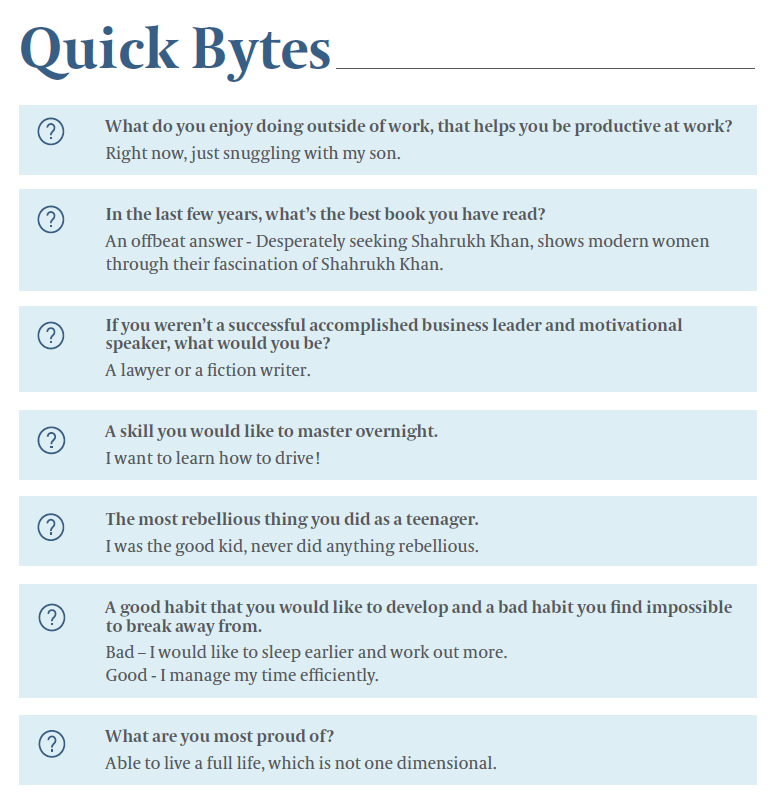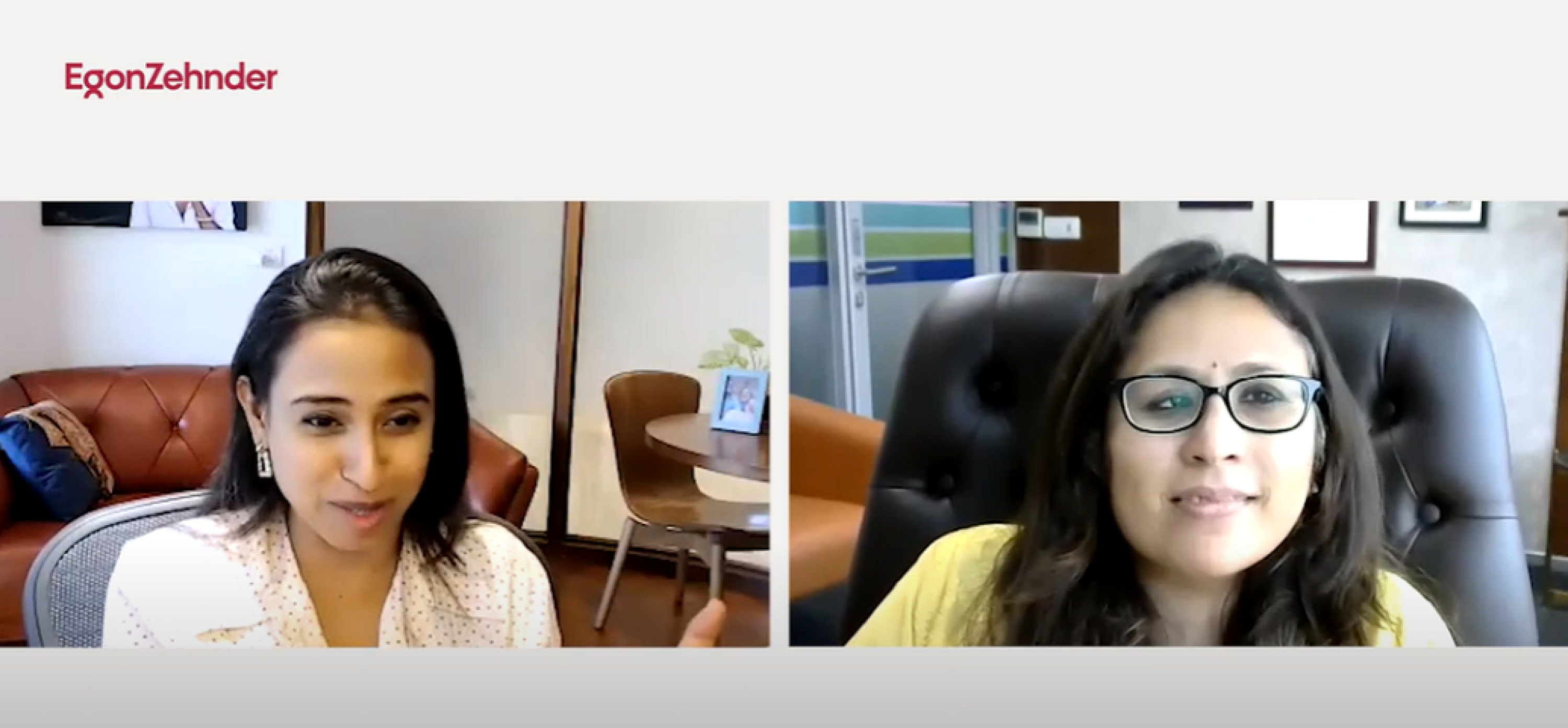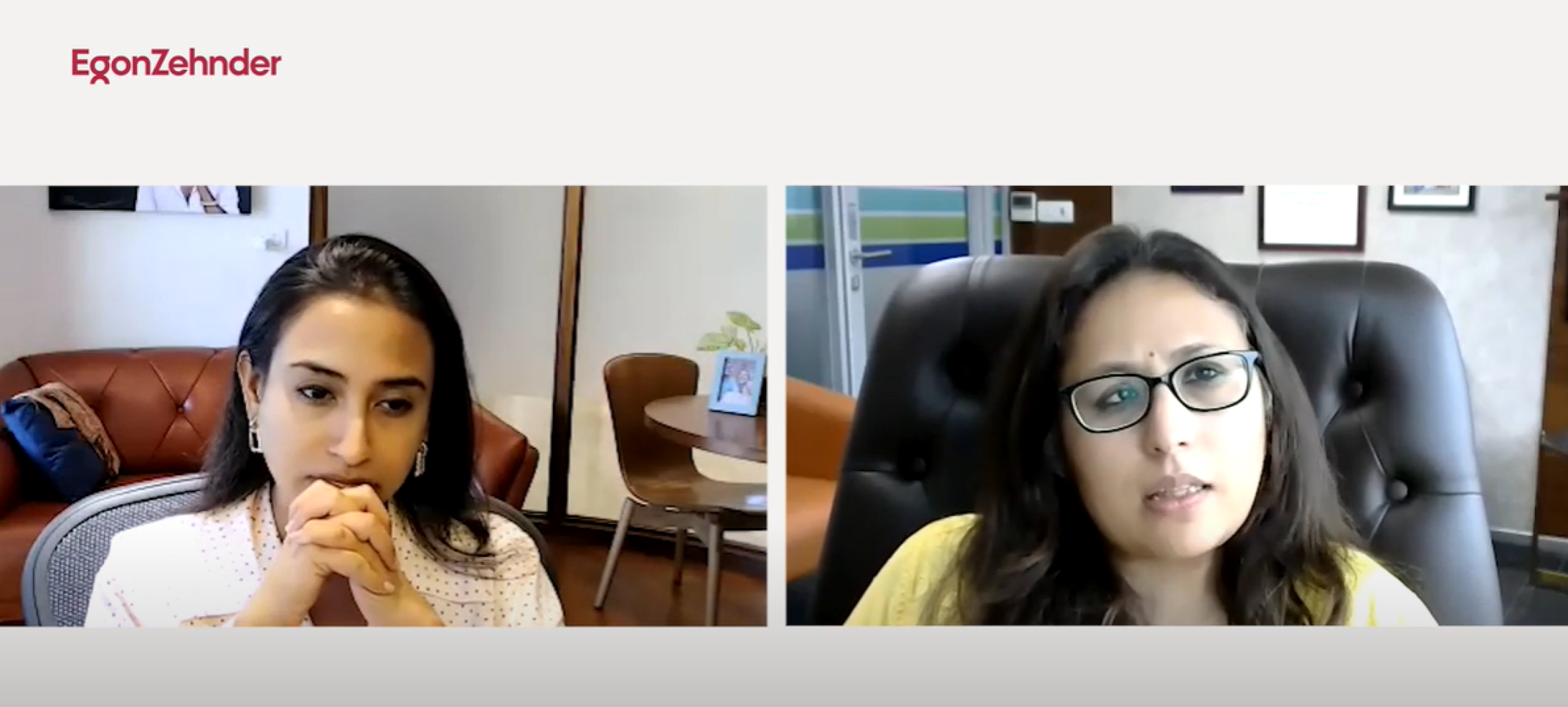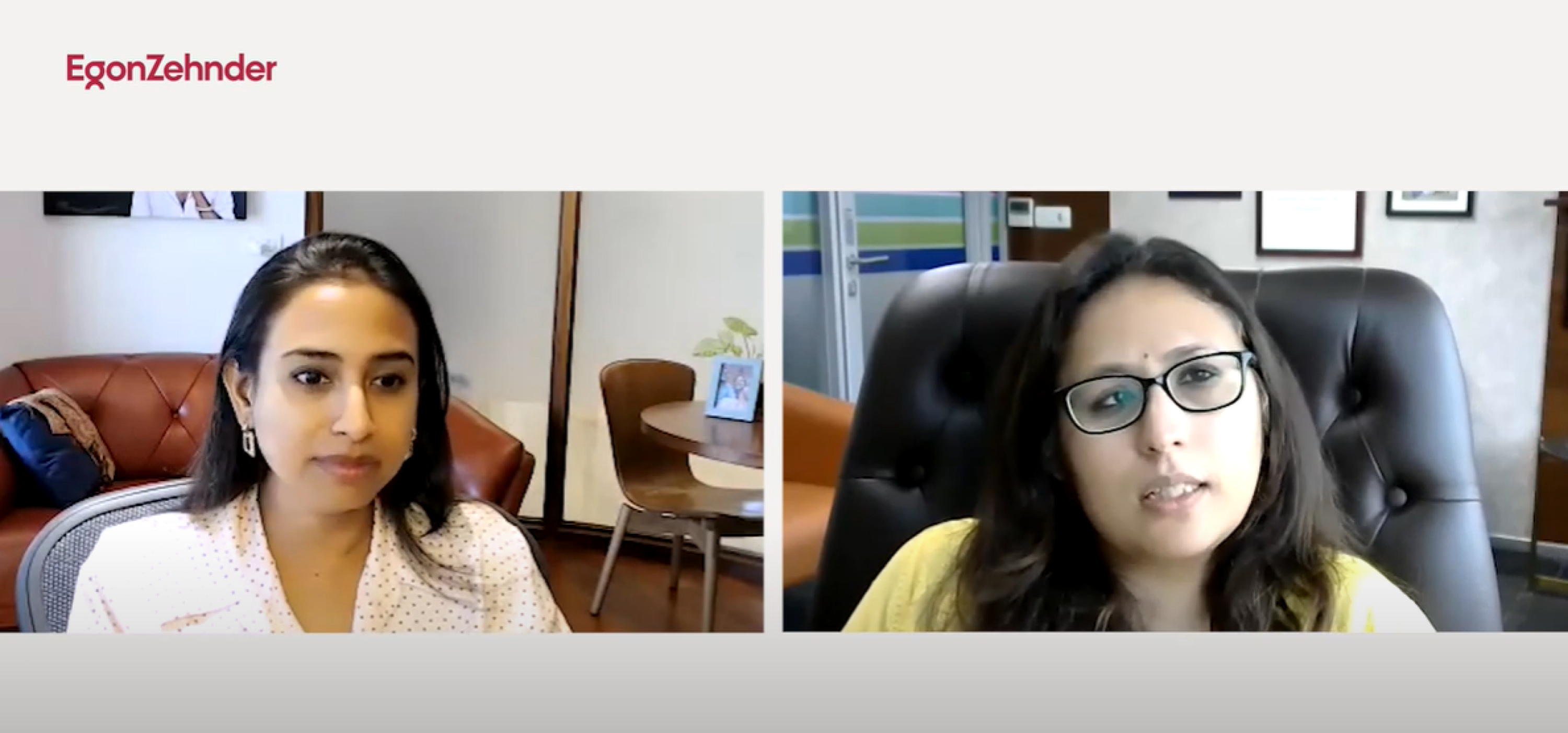Editor's Note: This interview is part of the Blazing a Trail: Women in Leadership series
Radhika Gupta’s career path may appear meticulously crafted from the outside, but in reality, it is a testament to her ability to adapt and seize unexpected opportunities. Her trajectory has been marked by exploration and reinvention, transitioning from the tech industry to consulting and ultimately to finance.
In our interview with Radhika, CEO of Edelweiss Asset Management, we delved into the experiences that have shaped her as a leader. Born in Pakistan and raised across continents due to her father’s diplomatic career, her nomadic childhood shaped her as highly adaptable and optimistic.
Despite her professional success, Radhika struggled to find her true professional identity. She transitioned from a phase of “swimming, struggling, figuring it out, and then finding the next opportunity” to gaining clarity about what truly resonated with her as a professional.
What stood out in our conversation was Radhika’s remarkable grounding and resilience. She shared, “All of these challenging times have taught me to keep moving and keep picking the lessons to guide me for the future.”
Explore the highlights of our interview below:
Radhika, you grew up moving across different continents and playing bridge. How have those experiences and values shaped you?
My childhood was not only defining but unique. My father joined the Foreign Services in 1976 and represented India as his career, but our life was nothing like that of glorified diplomats they show in movies. If I define one thing that shaped me, it was the moving around. I was born in Pakistan as my dad was posted in the consulate there. We moved countries every three years, from South Asia to Europe to Africa and to the Americas. The experiences living in those places were so different from what you get by travelling. They made me very adaptable, comfortable with change, and optimistic.
Playing bridge taught me that life is not about the cards you are dealt, it’s about what you make of those cards. It’s something I hold very close to me even today.
My parents are classic Indian middle-class parents, born in tough times, held middle class values of working hard and giving their children the best education. These people were far more than their circumstances and that’s the learning they inculcated in us.
How has this background translated to your career and life decisions? Were you more serendipitous or deliberate in your approach?
Every few years, I seek change in the sense that I wish to reimagine my role, myself, and the firm. The constant desire to reimagine every few years and put markers, that has carried over from my early life. I am unapologetically ambitious, and I have worked out the bigger picture. However, I don’t plan short term things such as career moves.
Thankfully, opportunities have come to me. Like in finance, I do believe that careers compound. For instance, a little bit after I became CEO, I got an opportunity to take public speaking coaching and I dove deep into it. I embraced public speaking, then got an opportunity to write a book, then a prospect on social media which led to World Economic Forum and so on.
That’s an interesting perspective and reflects in your career as well. What prompted you to move back to India, after your initial years?
One of the reasons why I talk about arranged careers, as opposite to pursuing a particular passion, is that there are people like me whose career path is one of discovery and different from that of our parents.
Going to Wharton, an Ivy League school, for a joint degree in Computer Science and Business felt like being a kid in a candy store. Two years into college, someone suggested trying internship in tech, and that’s how Microsoft happened. While I loved it, it was a little too technical for me. I thought about trying something with a wider platform, and that was consulting. That’s how I started at McKinsey & Co. right out of graduation.
Then it got monotonous after a while, and I was hungry to do more, get into an operating role and get my hands dirty. It was a little bit of being Goldilocks and finding the right chair. That’s how I joined the world of finance. AQR Capital happened to be run by an Alumnus and I entered the world of asset management again with no background, but I found my right fit. It took me a couple of years to understand it and it has been 15 years now!
Where do you draw the line between giving something a shot vs. realizing, ‘it isn’t for me!’ – when do you know you have hit a wall?
My answer to this has changed over time. When I was younger, I was figuring myself out and had my own set of challenges and confidence issues, hence decisions took much longer. Back then I was just diving into the pool – swimming, struggling, figuring it out and then finding the next opportunity.
Today I am a lot clearer. I am clear about what works for me and what doesn’t. What’s negotiable and what’s not. My experience over the years has given me both self-confidence and self-awareness.
Journeys are hardly linear. Have you been through any lows, and did you recognize them? How did you deal with them?
Undoubtedly many.
I struggled in my very early days at McKinsey because I had no notion of what a consulting career looks like. I remember it being extremely difficult in my first three years there. I was working 16-18 hours a day, working weekends, and constantly wondering what I had gotten into.
Secondly, I found 2008 extremely difficult, despite being promoted and surviving the layoffs in that market environment. There was so much noise and fear on the street about losing your job. I found that tremendously tough to go through.
Thirdly, moving into a corporate setup at Edelweiss after being an entrepreneur was quite challenging. I had never worked in a corporate firm in India, and I really struggled with that. I got brutal feedback and had some rough days. It took me some time to get into the groove.
But all of these challenging times have taught me to keep moving and keep picking the lessons to guide me for the future.
Have you been open to feedback and seeking help as someone who has handled large responsibilities early on?
It was a journey. When we sold the Forefront business in 2014, I was 30 – a reasonably young entrepreneur. I was a little apprehensive about giving up the control. Thankfully, Edelweiss as a firm is a very entrepreneurial place, but there is a shift in the environment. During my first annual performance review, I remember that I was in tears despite being a great performer. It was overwhelming, to say the least, being part of a large organization with so many people having opinions on how you work, perform, and build the business. It felt as if half the world was conspiring against me. A wise piece of advice that Venkat, my current boss gave me was that it takes three years to settle into what you are doing. And truly by 2016 I started feeling at home here. So, it was not so much doubting my capabilities but a sense of feeling lost.
I got this feeling again in 2017 when I focused on the mutual fund industry; where everyone knows everyone else, and I didn’t know anyone. Now I realize that it’s just a part of the journey.I got this feeling again in 2017 when I focused on the mutual fund industry; where everyone knows everyone else, and I didn’t know anyone. Now I realize that it’s just a part of the journey.
Being the youngest CEO in India leading a fortune 500 company, what part of your identity has shifted in being a CEO?
Being a CEO for the last six years has changed the person that I am in so many ways. I always thought of myself as a strong individual and performer, someone who would never shy away from taking accountability. You could throw me as much work, and I would happily carry the load. Delegation is not something that comes by easily to me, but now I have learnt to share the load.
Secondly, I used to despise tough conversations and avoided conflict but being an effective CEO means addressing conflict on a daily basis. I went from a conflict avoider to a conflict addresser.
I was since childhood a shy and reserved person, but not anymore. I am actually a very different version of myself after becoming CEO.
As an accomplished and vibrant female leader, if you zoom out and look at the workplace today, what are the bits you are happy and unhappy about?
There is more recognition of compassion and empathy at workplace. To work with a younger Indian population, it’s not about paycheck only but also about purpose, passion, and empathy. Vulnerability has become an acceptable word. There has been a lot of progress and I am very happy that this conversation is happening.
In terms of diversity, the conversation has become a lot more evolved, but companies have varying degrees of success. There are organizations that recognize diversity well beyond gender and there are others where it’s early days. We must realize that diversity is not a social cause, but it directly impacts the bottom line.
Another place we can do better is being a little bit more trustful about the workplace. If you look at most organizations, building trust is one place we need to work at. To create mutual respect and trust – that is a big and ongoing journey.
In the next 10 years, we will have four generations working together. Have you or Edelweiss tried anything to make the organization more transparent and trusting?
We do a lot of work without putting frameworks around it. I like to believe that we are a very open firm. Last year, we demolished half the grades in the firm. We also started 360-degree process and separated it from the yearly appraisal cycle. We also made it optional to share and discuss with your manager. While employees were wary initially, now everyone wants a 360 report, so they can work on the feedback knowing it will not impact their year-end outcomes.
We also do a CEO connect, where every six months we have different departments on a call with me. They come and ask me questions. Over the years, questions have gotten brutally open.
Furthermore, we are doing a lot of individualized coaching. Senior leadership is more receptive to individual coaching vis a vis a group setting. I went through a public speaking coaching myself. So, there are many small things that we are doing to build trust in our organization and the outcome is that in the last six years, we haven’t lost a single person in our senior leadership team.
As a CEO, what are you most proud of and most disappointed about?
I am most proud of the people and the confidence my team has – collectively, in each other and in the organization.
While there aren’t specific disappointments, we can do a better job of having more women in investing teams. We have many women in our leadership but haven’t achieved that in our investment functions.
Innately, do you feel like there is a bit of gender related confidence gap for a woman to lead a financial organization or team?
When we founded Forefront Capital Management, we were three partners and I had just returned to India. We would meet the brokers and they would shake hands with the guys but not with me. They assumed that the men were the investment folks, and I was the marketing person. The bias is very strong, and you consistently must assert yourself.
In my graduating class at Wharton, men would talk finance and stocks and women were never included in those conversations. The irony is that those women are doing wonderfully in finance domains today and helming various companies. We have done as well or better than the men in our cohort, which is something they now acknowledge.
I would not have done this earlier, but now, I call it out and do my bit to ensure that there isn’t a bias at my end, even subconsciously.
You recently had a child - how has motherhood changed you and how you show up at work?
I don’t know if there is a material change in the way I am at work. Perhaps it has made me clearer about my sense of priorities. I live life in lists and anything that is not make or break, I don’t prioritize for urgent or immediate. I have always been very efficient, do not deliberate decisions and like to step into execution mode. That has always been my style. I think that has just strengthened further since becoming a mother. There is only gratitude of being able to balance personal and professional life. It’s better than how I had imagined it.
How would you like the world to remember you?
As someone who inspired young men and women to live to their potential regardless of their limitations.









